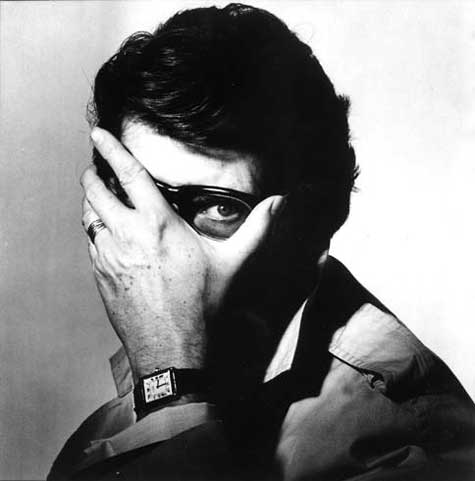-
"The ways in which people interact with computation are changing swiftly as we move into more casual relationships with our digital services on tablets, big screens, and across social networks. We believe we have some compelling answers about how digital experiences will evolve into these new contexts. Please, follow along with us and explore these playful, dynamic instruments of discovery together." These guys are going to be worth keeping a very beady eye on; what a team.
-
"I have been an avid gamer since the advent of Pong in 1972. At their best, videogames strike me as a form of art. Like all art, they can augment outer reality and shape our inner reality—but they do this by the very nature of the fact that they are not reality but a Place Apart. Being awestruck at "Halo" does not entail awe any more than "grieving" for Cordelia entails grief. Rather, art at its most serious is a sort of exercise, a formative practice for life—like meditation, only more fun." WSJ review of Reality is Broken; negative, but acute.
-
"‘In the winter dusk, at successive stations, we peer out to see the wives waiting behind steering wheels, children scuffling in back seats. Daddies descend and are met. Each set of participants knows only of its own little scene … Each welcomed father ought not to learn of the existence of dozens of others along the line, any more than a prisoner should hear of the execution of his fellows.’" Joe Moran on "Notes from Overground". This sounds great.
-
“Cartography used to be both an art and a science. I wanted to return to that.” This was my present to myself, as a souvenir, from SF. Looking forward to reading it properly – especially all the areas I never had a chance to visit – and can already confirm the maps are gorgeous. But really, it's about the whole package.
-
"If thousands and thousands of people are making games, then it's entirely unimportant if 99% of them are absolute garbage. That top 1% will still consist of plenty of games for us to play, and they'll be great." Lots of great quotations in this smart post from Bill Harris; this is just one, but I recommend the whole thing.
Blog All Dog-Eared Pages: In Praise of Shadows, Junichiro Tanizaki
16 February 2011
Matt Jones lent me this essay by Junichiro Tanizaki after I wrote about the soft, shadow displays of the Kindle over at the Berg website (and also, earlier, about patina).
In Praise Of Shadows is about several things: architecture, culture, and light. Tanizaki meanders around the topic of “shadows”, and the way soft, subtle, darkness is such an important part of Japanese culture. He ruminates on toilets, and lacquerware, on Noh, and on tradition.
It’s a rambling tour, but one with much to recommend it. Tanizaki was writing in 1933; he describes himself as “old”, but was 47 when he wrote the essay. Perhaps his affection for tradition made him feel older than he was. It’s also an interesting piece of writing, given its focus on the gap between West and East, and the Westernisation of Japanese society that was perceived as progress. It takes on an interesting resonance when you consider its place between two world wars.
Very much recommended – it’s a very brief read, and nice to read someone very comfortable with meandering in such a loosely structured manner. Thanks, Matt.
And now: some quotations that stood out.
p.14 – on how simple cultural artefacts reflect and influence so much of a culture:
To take a trivial example near at hand: I wrote a magazine article recently comparing the writing brush with the fountain pen, and in the course of it I remarked that if the device had been invented by the ancient Chinese or Japanese it would surely have a tufted end like our writing brush. The ink would not have been this bluish color but rather black, something like India ink, and it would have been made to seep down from the handle into the brush. And since we would have then found it inconvenient to write on Western paper, something near Japanese paper – even under mass production, if you will – would have been most in demand. Foreign ink and pen would not be as popular as they are; the talk of discarding our system of writing for Roman letters would be less noisy; people would still feel an affection for the old system. But more than that: our thought and our literature might not be imitating the West as they are, but might have pushed forward into new regions quite on their own. An insignificant little piece of writing equipment, when one thinks of it, has had a vast, almost boundless influence on our culture.
p.17 – on recording, and how the arts change to accommodate media:
Japanese music is above all a music of reticence, of atmosphere. When recorded, or amplified by a loudspeaker, the greater part of its charm is lost. In conversation, too, we prefer the soft voice, the understatement. Most important of all are the pauses. Yet the phonograph and radio render these moments of silence utterly lifeless. And so we distort the arts themselves to curry favor for them with the machines.
p.20 – on darkness and dirt:
I suppose I shall sound terrible defensive if I say that Westerners attempt to expose every speck of grime and eradicate it, while we Orientals carefully preserve and even idealize it. Yet for better or for worse we do love things that bear the mars of grime, soot, and weather, and we love the colors and the sheen that call to mind the past that made them. Living in these old houses among these old objects is in some mysterious way a source of peace and repose.
p.32 – on old paintings, found in the dark alcoves of temples:
The lack of clarity, far from disturbing us, seems to rather suit the painting perfectly. For the painting here is nothing more than another delicate surface upon which the faint, frail light can ply; it performs precisely the same function as the sand-textured wall. This is why we attach such importance to age and patina. A new painting, even one done in ink monochrome or subtle pastels, can quite destroy the shadows of an alcove, unless it is selected with the greatest care.
p.58 – on the Miyako hotel, furnished in a Western style:
Light is not used for reading or writing or sewing but for dispelling the shadows in the farthest corners, and this runs against the basic idea of the Japanese room. Something is salvaged when a person turns off the lights at home to save money, but at inns and restaurants there is inevitably too much light in the halls, on the stairs, in the doorway, the gate, the garden. The rooms and the water and stones outside become flat and shallow.
p.62 – on age:
There are those who say that when civilization progresses a bit further transportation facilities will move into the skies and under the ground, and that our streets will again be quiet, but I know perfectly well that when that day comes some new device for torturing the old will be invented.
-
"To celebrate the appearance of A Humument App on iPhone I shall shortly add a dozen or so newly revised pages." Awesome: the magically-changing book is taking shape.
-
Twenty-two lines, ten words a line, just like the blocks.
-
"The DJ Hero franchise will follow Guitar Hero into the flames, publisher Activision has confirmed.
Speaking at an investor call today, Activision Publishing CEO Eric Hirshberg explained that its entire music division was to close. It's not clear exactly how this will impact DJ Hero developer Freestyle Games nor Guitar Hero team Vicarious Visions, though the publisher confirmed that 500 jobs would be cut company-wide during restructuring."
Idiots. Not being able to flog something to death on an annual basis doesn't make it bad; indeed, both DJ Hero games were superb, rivalling the early Harmonix Guitar Heroes. A shame, especially for everyone at Freestyle. I do hate the games industry sometimes.
Media from 2010
03 January 2011
In 2009, I kept a textfile in ~/Documents to track all the books I read. In previous years, I’d forgotten what I’d read, and didn’t want to lose track.
At the end of the year, I was disappointed in how tiny the list was. This was mainly in down to 2009 being a rubbish year (as years go). But still: for someone who loves books, it wasn’t enough.
This year, I repeated the exercise, but with a file called media-2010.txt. The goal was to track everything I consumed, whether or not I liked it or not. My thinking was simple: I wanted to read more, but by tracking movies, TV shows, exhibitions, and games, I hoped that I could at least see what I was doing when I wasn’t reading.
This isn’t the full list, but it’s the picks of it for this year.
Films
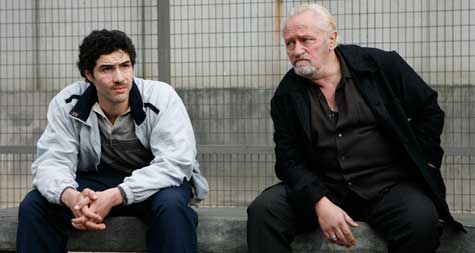
The best film I saw in 2010 was Jacques Audiard’s A Prophet. His The Beat That My Heart Skipped was already a firm favourite, so I was hugely enthusiastic for this, and really wasn’t disappointed. Superficially, it’s a prison drama, but there’s so much more going onto it than that, and it segues between life inside the prison, trips outside, and fantasy sequences with little fanfare. An early, pivotal scene of violence is brutal and truly unpleasant; it’s intended to stick with you throughout the movie, as it’s a hinge the plot sits upon. But outside that, violence is more a threat than a depiction, perhaps making the memory of that horrendous scene more notable.
It’s intense, nerve-wracking, and the promise of redemption dangled like a carrot in front of characters with many good reasons not to take it. Marvellous performances, wonderful moviemaking.
But: it really came out in 2009.
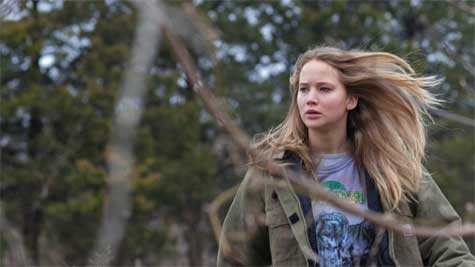
The best film I saw that was released in 2010 was Winter’s Bone; a cold slice of Ozarks-Noir. Which, of course, isn’t a genre, but the easiest way to describe this quest for a missing patriarch. Jennifer Lawrence’s performance is incredible, and I hope she’s rewarded. It’s not an easy movie by any means – the mountains are as much part of the scenery as they are written into the faces of much of the supporting cast – and you’ll never feel warm whilst watching it. It’s not a quest for redemption; just for survival. By the end of the film, it’s clear that all the characters are fighting to survive in their own ways. Great. (And: whilst Lawrence is the obvious stand-out, I loved John Hawkes’ nuanced performance as Teardrop).
I saw a lot, though, and enjoyed most things. I had a great time with Inception, primarily because I really like heist movies – put the team together, execute the job – and Nolan’s imaginative, clockwork plot played out as an excellent genre movie. It’s not necessarily clever, but it is intricate, and its execution is marvellous. Also, the suits are really good.
On the TV, I mainly enjoyed shows from America. The big discovery for me was Community, which is more inventive than many sitcoms I’ve seen a while. And I loved Rubicon for its intelligent take on intelligence work, even if it had a few too many plots for its own good, making its cancellation even more frustrating for fans. But what an actor’s show: Michael Cristofer’s Spangler is as devious as he is distracted, and Arliss Howard’s Ingram turned out to be exactly the sociopath you suspected he might be – an inventive sociopath, nontheless.
Books
Lots of alternate history this year.
Christopher Priest’s The Separation was a real stand-out – a tangly, bifurcated take on WWII, with two narratives of which only one can be true – though he refuses to commit to which. Twins, acting, impersonation, the negotiations of international politics; it’s a cracking read, and really shouldn’t have been buried on the SF shelf.
Similarly, Keith Roberts’ Pavane, a short-story sequence imagining England in the late 20th Century when ruled by a Holy Roman Empire was a real find. It’s a book heavily rooted in place: primarily around Dorset, Bournemouth, Dartmoor, that neck of the woods. In it, his characters enact a dance over fifty years – one that, initially, seems random, but structure eventually emerges. I also really liked the stuff about semaphore.
The biggest thing I read – spread throughout the year – was James Ellroy’s Underworld USA trilogy. The books stand alone well, if you don’t want to read the lot, and by the end, I think I can comfortably say that the very first (American Tabloid) is the best. They’re dense, knotted, slang-laden tales of politics and corruption, bad cops and good bagmen, surveillance and assassination, race and communism; the dark side of the sixties (and thus, the late fifties and early seventies – the lead-in and the results) explored through what might be true, might be history, might be a kind of alternate history. I was entranced, even when I squirmed through his machine-gun prose, the character’s casual racism (LA in the sixties as the black militant groups start to exert influence is not the most… sensitive setting), and the squicky violence. Though I like American Tabloid the first, Blood’s A Rover – 2009’s final installment – contains the clearest signs of redemption for many of the characters, and, in Don Crutchfield, one of Ellroy’s quietest protagonists.
Art
I think my favourite exhibitions of the year were the Irving Penn portraits at the NPG, and the Eadward Muybridge at Tate Britain.
The Penn was a lovely retrospective, showing an artist exploring portraiture and challenging its constraints. So much consistently inventive work throughout his career; so many brilliant portraits.
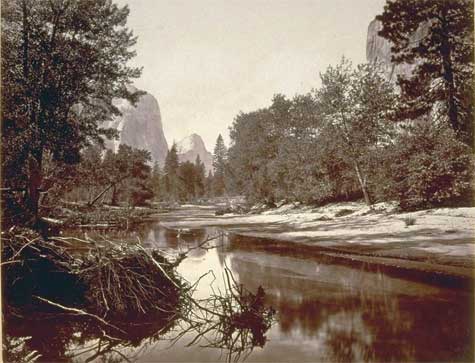
The Muybridge was a fascinating portrait of a man exploring photography itself. His time-and-motion images are rightly seminal, but what I wasn’t aware of was his landscape work – lugging huge photographic plates up the Californian hills, as an early landscape photographer. My favourite work in the exhibition were the gigantic, 360º panoramas of a pre-Earthquake San Francisco. An eccentric, then, but what an intrepid explorer of a nascent medium.
Oh, and special note to River Sounding at Somerset House; on a beautiful summer day, the thrumming, shaking bass of the Thames in its damp cellars was sensational.
Theatre
More trips to the theatre than in a long while, albeit still not many by the standard of the other sections of the list. One obvious stand out: The Old Vic’s revival of Tom Stoppard’s The Real Thing. Great to see this revived: in many ways, it’s one of his “straightest” plays, and manages to shift from a brilliant – if somehwat obvious opening – into a more thoughtful, considerate piece. It helped that Toby Stephens was utterly brilliant.
Music
One gig really stood out. Rival Schools at Hoxton Bar And Grill was a highlight. The post-hardcore group, almost on hiatus, return nine years after their first record with a second. And, with a falling star, comes a smaller venue: it sold out in an hour, was packed, and everybody knew the words to everything. And yet: so exciting to see such a polished, experience group of musicians still on top of the game, still playful – noodling around Beatles songs and metal covers between tracks – and playing to the audience perfectly.
And, of course, The Hold Steady in the summer played another of their great live sets: they’re fine enough on record, but are easily one of my favourite live acts: so much enthusiasm and energy, and, as ever, a ninety minute set with no duff moments.
Last.fm isn’t a representative example of what I enjoyed this year, strangely. Highlights from the CD stack: The Roots’ How I Got Over, the incredible My Beautiful Dark Twisted Fantasy, the Glasser and Warpaint albums, Scuba’s Triangulation, and many more besides.
My favourite moment in pop, though, was Nicki Minaj’s verse on Kanye’s Monster. For me, it’s one of the weaker tracks on MBDTF – until those ninety seconds, which are just something else. Seriously: best moment of the year.
Games

It’s hard to get away from Mass Effect 2, for me. My head tells me it’s exactly what I shouldn’t like – big, overarching, technical, lots of Up Front Story-Telling. It’s a bit too genre-heavy. And yet: my heart swelled as I played it. The gamer in me didn’t like the episodic structure, but the adult in me did: it played out like a series of Battlestar Galactica, broken near-perfectly into about 20-odd 45 minute chunks, advancing side-stories and main plot in turns. The shooting is now competent enough to not be hateful; the writing is great (when it’s not being a bit crap), and oh, the characters. Garrus, Thane, Legion, and especially Mordin; very strong. I know many people who didn’t get on with it, and I respect that: their problems were rarely mechanical, and usually about the universe, the characters, it not clicking. I think that’s OK – much better to dislike something because it’s not to your taste than because it’s entirely unlovable. Well done, Bioware.
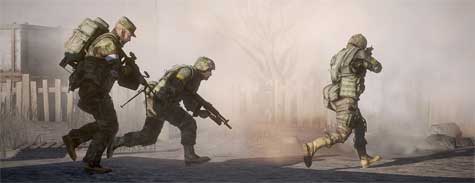
Battlefield: Bad Company 2, as well as being a total mouthful to say, was a surprise hit for me, and featured my favourite piece of gaming interface design last year: the way it utilises the back/select button. Public servers feature teamwork, almost no abuse, and very little voice chat, simply because of that button. It marks targets you’ve seen, and the little icon above them becomes visible for your whole team. As a result: everyone marks targets for everyone else. They get points for the mark, you get points for the kill, and so you mark targets for them. We don’t need to talk, or try to get people to play the team game, or argue with idiots, because we’ve got the back button. Couple that with the ability to respawn on squadmates, rather than way back at base, and BFBC2 works teamplay into its very mechanics without being complex or nerdy. The Vietnam expansion has brought people back, but the main game is still played to a high, social standard. The only team-game with public serves this good is TF2, in my tiny, humble opinion. And: the sound-design is phenomenal.
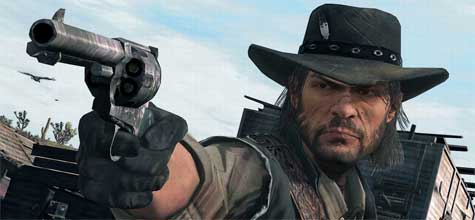
Red Dead Redemption was totally captivating for the twenty-or-so hours I explored its landscape, sidequests, and primary plot. It was lovely to see a genre so rarely explored in games done pretty well, although I do hope that some of the topics it explored – journey-as-narrative, most notably – can be explored without the brute force of a Rockstar budget and (alleged) Rockstar San Diego working practices.
Super Meat Boy is brilliant. Totally the sort of game my head likes. If you’ve not played it, you should. It’s got the tightest controls I’ve ever seen on a 360, brilliant level design, hilarious replays, and it manages to be the best kind of “old-school” fun. It’s nearly caused me to break a few controllers, but that’s part of the charm.
What else? Halo Reach, for starters. Halo is such an acquired taste, in my opinion; a real gamer’s game. After not caring much for 3, I ended up adoring Reach; a fine single-player campaign, tight, subtle multiplayer, and the rush that is Firefight. So much Firefight; so many grunts exploding in confetti. In some ways, it’s the top of the list – the most gamey-game I played this year. But it’s polish on something that was great to begin with, and not for everyone. If you’ve played it and liked it, you already know.
I didn’t play enough Super Street Fighter IV after giving so much time to the original, non-super variant last year. No matter; it’s not going away any time soon. And my unfinished pile is still high – right now, I’m enjoying Castlevania: Lords of Shadow and the majestic Need For Speed: Hot Pursuit, and they’re going to see me well into 2011.
That was a few things I liked in 2010; by no means all. Next year: more.
-
"The writing I enjoy doing most, every year, is marginalia: spontaneous bursts of pure, private response to whatever book happens to be in front of me. It’s the most intimate, complete, and honest form of criticism possible — not the big wide-angle aerial shot you get from an official review essay, but a moment-by-moment record of what a book actually feels like to the actively reading brain. Here are some snapshots, month by month, of my marginalia from 2010." Marvellous stuff from Anderson – funny, wry, hard to argue with. I am not good at marginalia, resorting to dog-earing the bottom of a page, and later, trying to remember why.
-
"Next time somebody's trying to sell you on the awesomeness of their new data technique, ask to see a prototype. If they haven't got that far, it's snake oil." Everything in this article is, basically, true. It's a really good run-down of all the issues that emerge in the reality of dealing with data-driven products at any scale."
-
"I want to love books, but if the publisher treats them merely as interchangeable units, where the details don’t matter so long as the bits, the “content”, is conveyed as cheaply as possible, then we may be falling out of love." Phil buys a new volume of Pepys, finds it's now being printed on-demand, and talks a little about the perceived quality of such books. In short: if you're not expecting it, and it's a change to the usual, it makes you feel a bit like the publisher doesn't care about it.
-
"This is all very preliminary, but here is a first pass as a Processing Kinect library." Ooh.
-
Trap streets – yes, of course. But trap rooms; trap architectures? That's iiinteresting.
-
"Bookland is a fictitious country created in the 1980s in order to reserve a Unique Country Code (UCC) prefix for EAN identifiers of published books, regardless of country of origin, so that the EAN space can catalog books by ISBN rather than maintaining a redundant parallel numbering system." Awesome. Via Kim (who else?)
-
"This tutorial assumes no previous knowledge of scripting or programming, but progresses rapidly toward an intermediate/advanced level of instruction . . . all the while sneaking in little nuggets of UNIX® wisdom and lore. It serves as a textbook, a manual for self-study, and a reference and source of knowledge on shell scripting techniques. The exercises and heavily-commented examples invite active reader participation, under the premise that the only way to really learn scripting is to write scripts." Really good stuff, which Nick pointed me at this morning when I revealed I couldn't write bash scripts.
-
"Both within the academy and within tech startups, we’ve been hearing some similar questions lately: Where can I find a good data scientist? What do I need to learn to become a data scientist? Or more succinctly: What is data science?" Great starting point; looking forward to more from the blog.
-
"When someone with a bad case fails to finish a book, they don’t start a new one; they go into a holding pattern, crippled by guilt over their failure and unable to let go and start over. All reading stops. People have confessed to me that it’s been months since they last picked up a book, because they still haven’t finished the last one." Yup. We really don't have to finish this book, sometimes.
-
"Far Cry 2 invites fatalism, pessimism, and near-suicidal tactics because optimism and strategy went on holiday to Leboa-Sako and got murdered just like everything else. Hoping for the best doesn’t work. Being clever doesn’t work. Nothing good will ever happen to you in Far Cry 2′s Africa, and none of your carefully-designed plans will ever bear fruit."
-
"The optical future of architectural ornament: light with content. <br />
<br />
That is, you get home with your digital camera and you click back through to see what you've photographed—and there are words, shapes, and objects hovering there in the street, or inside the buildings you once stood within, visual data only revealed through long-exposures." Brilliant. -
"After seeing there is a turing complete language in game, I felt like I should do something interesting with redstone in Minecraft. People already have done clocks and adders so I wanted to do something a little different while also be potentially useful. As a result, I designed out a ticker display." At least as crazy as those LittleBigPlanet calculators.
-
"Nelson, as described by IDEO in the video above, does so much work for you. It throws multiple perspectives into the equation, killing the unreliable narrator with the gifts of foresight and hindsight. It does away with the unexplainable appeal of a surprising hit novel giving you a league table of books to pick from according to their “impact on popular opinion and debate.” You’ll struggle to form your own opinion as you jump through the layers that Nelson offers you, given a perspective like a student browbeaten by an overbearing A-Level tutor." I similarly disliked their attempts to not only redesign the book, but to try to redesign narrative, in "Alice" – as if people hadn't tried, and as if what narrative _really_ needed was just a good design firm to take a crack at it.
